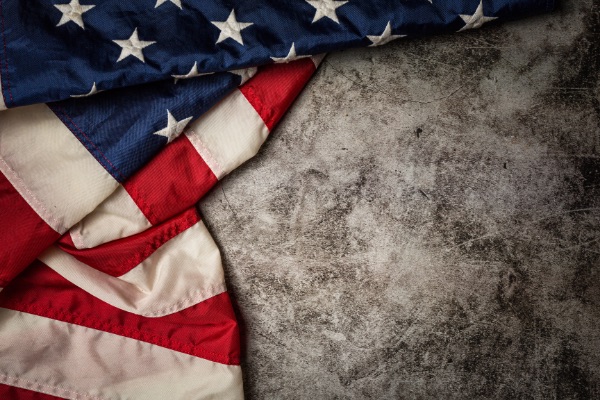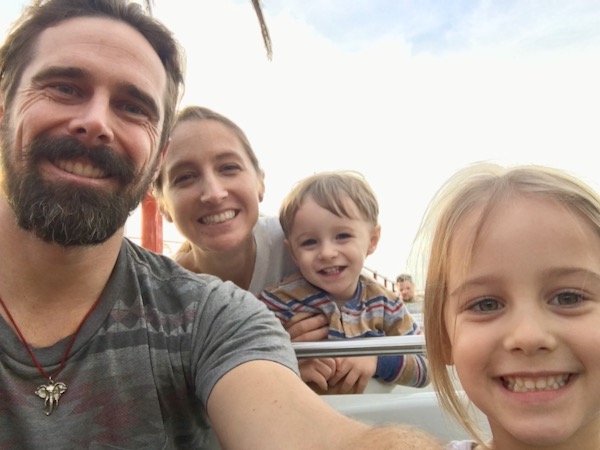Australian alumnus Christopher Stanley sees hope during a unique year in the USA
America, America, so much to love. No other country has created such wealth, such scientific advancement, such institutional success in educational pursuits. I admire this, yet . . . .
Over the last four years I’ve enjoyed making a home and laying foundations with my wife Jody, who is an American, and children Adaline, 5, and Chester, 2. But this is a unique year to be living in a unique country as an enculturated Australian. And I admit: I struggle to comprehend some of the ways this society functions. It can feel like deep cognitive dissonance.
One of the foundations in this land of the free is that an individual has indisputable rights. No other country has pursued the virtue of individualism as single-mindedly as the United States. Despite this, there are times where the individual ethos meets the necessity of collective action, cooperation, personal sacrifice and solidarity. But at the moment, the country doesn’t appear to have the political will for such solutions.
My family and I live directly across the street from a well-maintained, beautiful park, complete with established trees, a pool, three covered basketball courts, a skate park and a children’s acting studio. I love this park. But just a few weeks ago, while relaxing in our living room on a Sunday afternoon, we heard five “pops” coming from the park. Over a dispute, a teenager had shot and wounded a peer, while children and families ran tripping over each other as they fled. The teenager had easy access to a gun, as so many people do. The individual right to possess firearms is enshrined in the constitution. This comes at a cost: more guns, more gun violence. The country, for now, seems OK with this.
My family and I are also privileged. I have access to healthcare provided by a private company. My employer pays more than $USD18,000 each year to cover my family. The care is good and we have access to doctors when needed. This is a country where some of the best care is available, hospitals are generally close and able to perform medical miracles, while research and development of new practices is unparalleled. But the lack of the collective approach, evidenced so clearly during this pandemic, means some do not have access to or cannot afford healthcare.1 A staggering number have failed to receive due care and the likelihood of someone surviving COVID-19 is directly correlated to their economic position. Despite the huge amounts of charitable care given for emergency situations, it isn’t a complete healthcare plan.
The pandemic has broadened the controversy around the American health system even beyond active care for patients. As COVID-19 brought public health issues to the forefront of daily life, every aspect of the crisis has become politicised and, as such, there is no consensus about what public health goals should be, let alone how to reach them. Meeting challenges that can be solved only with cooperative action and resolve feels outside the realm of possibility at the moment. People are isolated, physically and politically, and each side assumes the outright malevolence of the other.
In the midst of the fear and anger surrounding public health issues, several events brought the country’s deeply troubled history with racism to the fore. The United States has proudly proclaimed itself to be a melting pot of cultures and its most famous statue—the Statue of Liberty in New York—stands upon words dedicated to crafting a multicultural sanctuary of freedom.2
And yet, in the early days of the Black Lives Matter (BLM) protests, a tweet was sent rapidly around our city indicating a desire to protest. The residents went downtown and brought all their weapons to stand against the expected BLM protests, in defiance of the state’s laws against openly carrying firearms. They set up tables with guns on rooftops of businesses, with shooters stationed up and down the main street. The extent of the protest: a middle-aged woman quietly standing with a sign and three teenagers, who were sitting on the curb in front of a petrol station looking exhausted and scared. I pulled my truck around behind them and greeted them. “Is this it?” I asked. “Yeah,” they said. The woman asked me about my accent and apologised on behalf of Yucaipa. By this time, the residents in front of the café started yelling obscene racial slurs. The four protesters stayed just a little longer before walking off. The residents spent the rest of the evening at what looked to me like a sort of white pride parade. Yes, the United States is a country with vast multiculturalism but it has a very thin breaking point and the divisions it masks are terrifying.
This year has drawn to a close with what seems like a sadly fitting coda. The election, the quintessential collective agreement of American democracy, is mired in controversy and strife. But perhaps the most striking part: it’s no longer surprising. It’s easy to feel discouraged.
No country is free from inequality, serious disagreements, missteps. But as an outsider living here, it’s been hard to wrap my head around the deep contrasts and the general feeling that the problems, divisions and suffering, even at such a scale, are inevitable and require no collective effort. How can such capability be paired with such disorder in the face of large-scale challenges?
I experienced culture shock when I first moved here, and this year has presented fresh challenges. But I’m grateful they are not the only reality. I do love life here. There are many people and places where I find cooperation and beautiful empathy. The church I pastor feels like its reason for existence supersedes partisanship. It is a community where an incredibly disparate group of people—from different backgrounds and with different ideologies and experiences—gather to learn how to love better. With a united voice we say God is our highest allegiance. This provides stability.
While there’s no denying the feelings of instability, anger and fear in the United States caused by the events of this year, even a cursory look at history will show it has weathered turbulent times. The country managed to find its footing then and again—not perfectly, of course, but enough to take another step. This is the hope, and broad assumption, of the people here. I take comfort in this. I feel optimistic about the life we are building here. But, crikey, I hope that next step comes soon.
References
1. The Seventh-day Adventist Church’s Loma Linda University Health offers some free care—it serves uninsured people on principle.
2. “The New Colossus,” a sonnet by American poet Emma Lazarus, who wrote it in 1883 to raise money for the construction of a pedestal for the Statue of Liberty, is now cast onto a bronze plaque and mounted inside the pedestal’s lower level. It reads, in part, “‘Give me your tired, your poor/ Your huddled masses yearning to breathe free/ The wretched refuse of your teeming shore. Send these, the homeless, tempest-tost to me/ I lift my lamp beside the golden door!’.”
Photograph
Photo created by jcomp, from www.freepik.com.
Share


